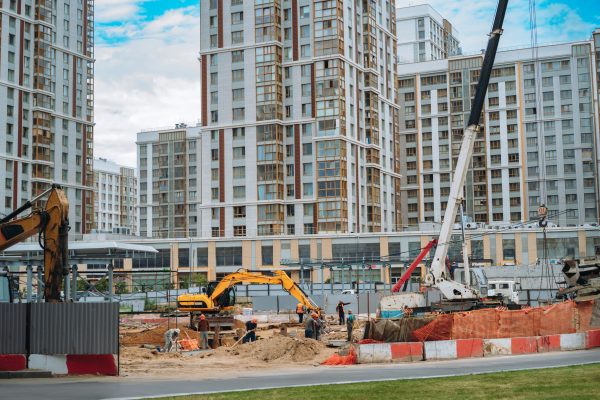Geotechnical failures can significantly impact a project’s budget, potentially increasing construction costs by up to 25%, according to SGS. This makes geotechnical expertise indispensable for any large-scale project, whether it’s a towering skyscraper, a highway, a bridge, or a tunnel. Geotechnical engineers play a critical role in ensuring the success and longevity of these structures. They analyze subsurface conditions and soil composition, and identify potential hazards that could affect the project’s safety and stability. By addressing these hidden complexities beneath the surface, geotechnical engineers lay the groundwork—both literally and figuratively—for construction that is safe, cost-effective, and sustainable, preventing costly issues down the road.
In this blog, we will delve into why geotechnical expertise is crucial for large-scale construction projects. We’ll also tackle the role geotechnical engineers play. Lastly, we’ll share with you how their work contributes to the safety, efficiency, and success of these endeavors.
Understanding Geotechnical Engineering

Geotechnical engineering is a branch of civil engineering that focuses on analyzing the earth’s subsurface. They analyze soil, rock, and groundwater conditions. Furthermore, they assess risks and provide recommendations for safe and stable construction. The work of geotechnical engineers includes soil testing, slope stability analysis, foundation design, and the evaluation of seismic risks.
Their goal is to ensure that the ground can support the weight and stresses imposed by the structure. Without this critical analysis, the project could face serious challenges. There could be foundation failure, landslides, excessive settlement, or even complete structural collapse.
At BizForce, our highly skilled geotechnical engineers offer remote support to clients, providing the expertise needed to assess subsurface conditions and deliver accurate, safe recommendations for large-scale projects. With our team of remote professionals, we ensure that every structure is built on a solid foundation, minimizing risks and maximizing project success from anywhere in the world.
The Role of Geotechnical Engineers in Large-Scale Projects
On large-scale construction projects, geotechnical engineers perform several key tasks that directly impact the design, planning, and execution of the project. Let’s explore some of their major responsibilities and why they are vital for project success:
-
Site Investigation and Soil Analysis
Before any construction begins, geotechnical engineers conduct thorough site investigations. They assess the suitability of the ground for the proposed structure. This involves drilling boreholes, taking soil samples, and performing laboratory tests to understand the soil’s composition, strength, and stability. Soil characteristics can vary significantly, even within small areas. Therefore, this analysis is essential in determining the appropriate foundation design and construction techniques.
For instance, clay-rich soils can be prone to swelling when wet, while sandy soils might not have the stability required to support heavy loads. Geotechnical engineers use this information to advise on the best type of foundation. Whether it’s shallow, deep, or pile-based, they’ll recommend soil improvement techniques if necessary. In large-scale projects, getting this right from the start can save millions of dollars in remediation costs later.
-
Foundation Design
The foundation is arguably the most critical component of any construction project. It supports the entire structure. Geotechnical engineers provide crucial input into the design of foundations by assessing the bearing capacity of the soil and determining the best type of foundation to ensure stability and durability.
In large-scale projects, such as high-rise buildings or bridges, the foundation must withstand significant loads, which makes the input of geotechnical engineers essential. They take into account factors like soil settlement, the presence of water tables, and potential seismic activity to design foundations that minimize risks. A poorly designed foundation can lead to settlement, tilting, or even catastrophic structural failure.
-
Slope Stability and Retaining Structures
Large-scale projects often involve excavation and building on sloped terrain, which can introduce the risk of landslides or erosion. Geotechnical engineers assess slope stability to ensure that the ground will remain stable throughout the construction process and during the lifetime of the structure.
Additionally, they design retaining walls and other support structures to prevent soil from shifting or collapsing. These structures are especially important in projects like highways, dams, and underground construction, where instability can pose serious safety risks.
-
Water Management

Managing groundwater and surface water is another critical area where geotechnical expertise plays a key role. Water can dramatically alter the properties of soil, making it weaker or causing erosion. In some cases, excessive groundwater pressure can lead to foundation instability or slope failure.
Geotechnical engineers assess the water conditions at the site and recommend appropriate drainage solutions, waterproofing methods, and dewatering techniques. Effective water management prevents issues like flooding, soil erosion, and hydrostatic pressure buildup, which could compromise the integrity of the structure.
For example, in tunnel construction or projects near water bodies, proper water management is essential to prevent flooding or seepage into the construction area. Geotechnical engineers also help ensure that stormwater drainage systems are well-designed to handle runoff, particularly in areas prone to heavy rain.
-
Seismic Risk Assessment
In regions prone to earthquakes, seismic risk assessment is an essential part of the geotechnical analysis. Geotechnical engineers study the seismic history of the area. They evaluate the potential for ground shaking and design foundations and structures that can withstand the dynamic forces generated by earthquakes.
For large-scale projects like bridges, skyscrapers, and dams, failure to account for seismic risks can lead to disastrous outcomes. By designing earthquake-resistant foundations and reinforcing structures, geotechnical engineers help mitigate the risks of seismic activity and protect both the structure and its occupants.
-
Sustainability and Environmental Impact
Sustainability is an increasingly important factor in large-scale construction, and geotechnical engineers play a crucial role in minimizing the environmental impact of construction projects. They evaluate the potential for soil contamination, erosion, and other environmental risks, recommending solutions that reduce harm to the surrounding ecosystem.
Additionally, geotechnical engineers may suggest eco-friendly alternatives. For instance, they’ll suggest using recycled materials in foundation construction, implementing erosion control measures, or designing drainage systems that minimize water pollution. Their geotechnical expertise helps ensure that large-scale projects are not only safe and durable but also environmentally responsible.
The Consequences of Neglecting Geotechnical Expertise
Failing to incorporate geotechnical expertise in large-scale construction projects can lead to severe consequences. Poor soil analysis or inadequate foundation design can result in costly delays, structural damage, and even complete project failure. Here are a few examples of what can go wrong when geotechnical considerations are overlooked:
Foundation Failure
Without proper geotechnical analysis, the soil may not support the structure, leading to sinking, tilting, or collapse.
Landslides and Erosion
On projects involving slopes or elevated terrain, the absence of geotechnical input can lead to landslides, threatening lives and property.
Water Damage
Improper groundwater management can lead to flooding, foundation instability, or erosion of soil around the structure.
Seismic Vulnerability
In earthquake-prone areas, failure to account for seismic risks can result in devastating structural failures during an earthquake.
These risks underscore why geotechnical expertise is not just a luxury but a necessity in large-scale construction projects.
Conclusion
Geotechnical engineering is an essential element of large-scale construction projects. Geotechnical engineers provide the expertise needed to assess the conditions of the earth. They recommend appropriate foundation designs, ensure slope stability, manage water, and assess seismic risks. What’s more, their contributions are critical for the safety, efficiency, and longevity of large-scale structures. By addressing the challenges below the surface, geotechnical engineers help prevent costly mistakes and ensure that construction projects stand the test of time.
At BizForce, we provide top-tier remote geotechnical engineers who are ready to bring their expertise to your large-scale construction projects. With our experienced professionals on your team, you’ll gain the knowledge and skills needed to assess subsurface conditions, design stable foundations, and manage critical factors like water and seismic risks—all while keeping your project safe, efficient, and cost-effective.
Partner with BizForce today to access the geotechnical talent you need to ensure your construction project stands the test of time. Let’s build your success from the ground up—contact us now.
